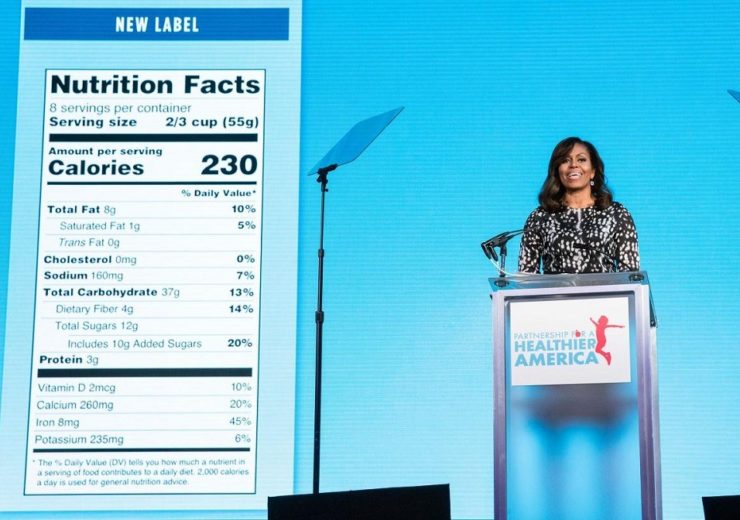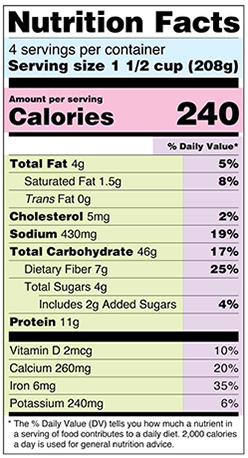According to a new study, the FDA's sugar labelling policy could either prevent or postpone up to 708,800 cases of heart disease and 1.2 million cases of diabetes if the food industry reforms

The then First Lady Michelle Obama announced the modernised Nutrition Facts label for packaged foods during the Partnership for a Healthier America (PHA) 2016 (Official White House Photo by Chuck Kennedy)
The introduction of a new sugar labelling policy by the US Food and Drug Administration (FDA) could save $31bn (£23.6bn) in net healthcare costs and $61.9bn (£47.2bn) in societal costs, according to research.
The new study, conducted by researchers from the University of Liverpool at the Friedman School of Nutrition Science and Policy at the Massachusetts-based Tufts University, found it could save up to $175bn (£134bn) in these costs between 2018 and 2037 should the food industry reform as a result of the legislation.
It estimated the FDA’s added sugar labelling mandate – which will force food and drink manufacturers to add extra information about nutrition content – could also either prevent or postpone up to 708,800 cases of heart disease and 1.2 million cases of diabetes in this scenario.
Co-senior author and professor in epidemiology at the University of Liverpool, Professor Martin O’Flaherty, said: “Informing consumers about what is in their sugary drinks, cakes and sweets will help them decide what they want to eat for their health now and later.

“Full implementation of the label before 2021 could help maximise health and economic gains.”
What is the new FDA sugar labelling policy?
In May 2016, the FDA announced it would implement new “nutrition facts” labels for food packaging to reflect new scientific information.
Food manufacturers with annual sales of $10m (£7.6bn) or more must implement the new labels on all its products by 1 January 2020.
Manufacturers with less than $10m (£7.6m) have until 1 January 2021 to comply.
On 6 September 2018, the former FDA commissioner Dr Scott Gottlieb set out the organisation’s final rules when it came to food labelling.
Dr Gottlieb said: “This updated label is empowering consumers with accurate and science-based information to help them make more informed, healthier choices.
“As part of our updates to the nutrition facts label, we’ve leveraged the latest information we have on nutritional science with the intent to help reduce the burden of chronic diseases like diabetes, obesity, and heart disease.”
The new information that must feature on the label include the increased emphasis put on the serving size per container and the amount of calories per serving of the food.
Products also have to include a “daily value”, which focuses on how many nutrients each product in the food gives a person, in percentages.

Impact of new sugar labelling policy
In its analysis, the team extended the US international model for policy analysis of agricultural commodities and trade (IMPACT) set up by the International Food Policy Research Institute (IFPRI), started in 1993.
It found the sugar labelling policy could increase the amount of quality adjusted life-years (QALYs) – a complex formula that measures an individual’s life quality – in the US by 727,000 years.
Some 354,400 cases of cardiovascular disease and 599,300 cases of diabetes could be prevented or postponed.
It also made estimations based on a scenario in which the food industry changed its sugar contents following the labelling policy reform.
The research found that if this was the case, it could prevent or postpone 708,800 cases of cardiovascular disease and 1.2 million cases of diabetes.
It could also lead to a 1.3 million gain in QALYs, while saving $57.6bn (£43.9bn) in net healthcare and $113.2bn (£86.4bn) in societal costs.
Dr Renata Micha, the study’s co-senior and corresponding author and research associate at the Friedman School, said: “The added sugar label is an important policy step toward consumption of food and beverages with high added sugar contents, improving health, and lowering healthcare spending.
“These findings have important implications for individuals, policy makers, and the food industry alike.
“Modest industry reformulation would be a powerful way to maximise potential benefits, highlighting industry’s critical role in being part of the solution.”
